It is recommended that children should have their first eye examination before they start Primary School. It’s also really important that children are tested regularly as they are less likely than adults to notice that there is a problem with their sight. We can advise on how regularly after the first examination.
Research shows that one in five children has an undetected eye problem which directly impacts their ability to reach their full potential.
Should they need glasses, we have a wide selection of children’s frames designed specifically for young faces. Many have soft nose pads for extra comfort and spring hinges to stand up to the rough and tumble of the playground.
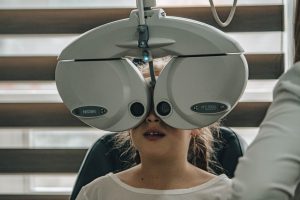
Is there a charge for children’s eye examinations?
Children’s eye examinations are available on the NHS for everyone under 16 (or under 19 if in full time education). If your child needs glasses, there is also an NHS contribution to the cost. We have a selection of frames which are covered by an NHS voucher.
What happens if my child doesn’t know their letters or isn’t able to talk?
We can examine your child’s vision using a range of alternative test charts, our optometrists are experienced in dealing with children, however we cannot perform examinations on children under the age of three and recommend you seek advice from your GP if you are concerned about any vision issues, as a referral to a paediatric specialist may be required.
We also encourage parents or guardians to participate in their child’s exams, as the more you understand about their prescription and the various solutions on offer, the more you’ll be able to help them in the long-term.
What are the signs of eye problems in children?
There are many warning signs but the main ones are:
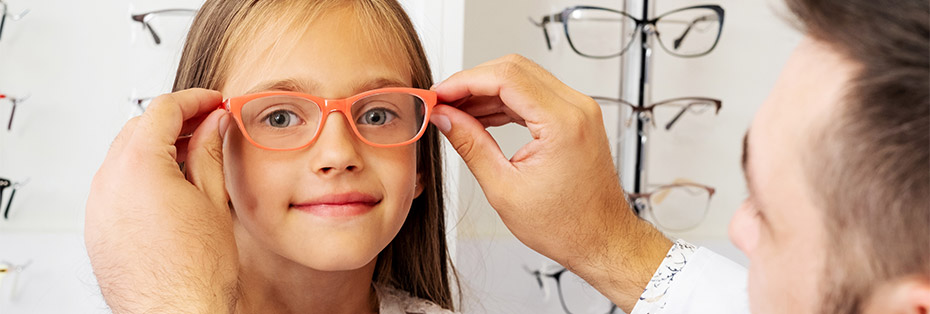
Will I be able to accompany my child during their eye examination?
Yes. If your child is under 16 it is a legal requirement that a parent or guardian accompanies them in the examination room.
In response to an increasing number of patients seeking relief from dry, gritty and uncomfortable eyes, we are proud to introduce our dedicated Dry Eye Clinic at our Crystal Palace branch. Our goal is to alleviate the discomfort caused by dry eye disease and enhance the quality of life for those affected.
Your journey toward effective dry eye relief begins with a comprehensive, hour long consultation. During this appointment, we take the time to understand your symptoms in detail and develop a tailored management plan to address your specific needs.
The initial consultation includes:
Below, you’ll find information about our current in-practice therapies for dry eye management.

IRPL (Intense Regulated Pulsed Light) and IPL (Intense Pulsed Light) technology, including TearStim, has been shown to improve the function of the meibomian glands—enhancing tear quality and reducing dry eye symptoms.
The TearStim procedure is fast, non-invasive, and comfortable. Here’s what you can expect during your session:
This process is then repeated on the lower lid of your other eye.
A course of 3 to 4 sessions is typically recommended for optimal results. Depending on the severity of your symptoms, the therapeutic effects may not be noticeable until after the third or fourth session. After completing the initial course, results can last anywhere from 6 months to 3 years.
To maintain long-term relief, booster sessions are advised once or twice per year, depending on individual needs.
Please note this treatment option is not suitable for all dry eye sufferers; your optometrist will run through the suitability criteria to ensure that this is the correct management option for you!
Thermal Pulsation Therapy for Meibomian Gland Dysfunction
ACTIVA is a non-invasive treatment designed to target Meibomian Gland Dysfunction (MGD)—a leading cause of evaporative dry eye. By combining controlled heat and gentle vibration.
ACTIVA therapy is performed in-practice under the supervision of our trained Dry Eye Specialist. The treatment involves wearing a specialised eye mask that delivers targeted heat at a precise temperature, followed by a vibrating massage to the eyelids.
This dual action approach helps to:
Initial Consultation – £85
Treatment Fees
DRY EYE PLAN – £25 per month
Our tears are made up of three layers, a mucin base layer, a watery or aqueous layer which is the bulk of the tear film and a lipid or oily front layer.
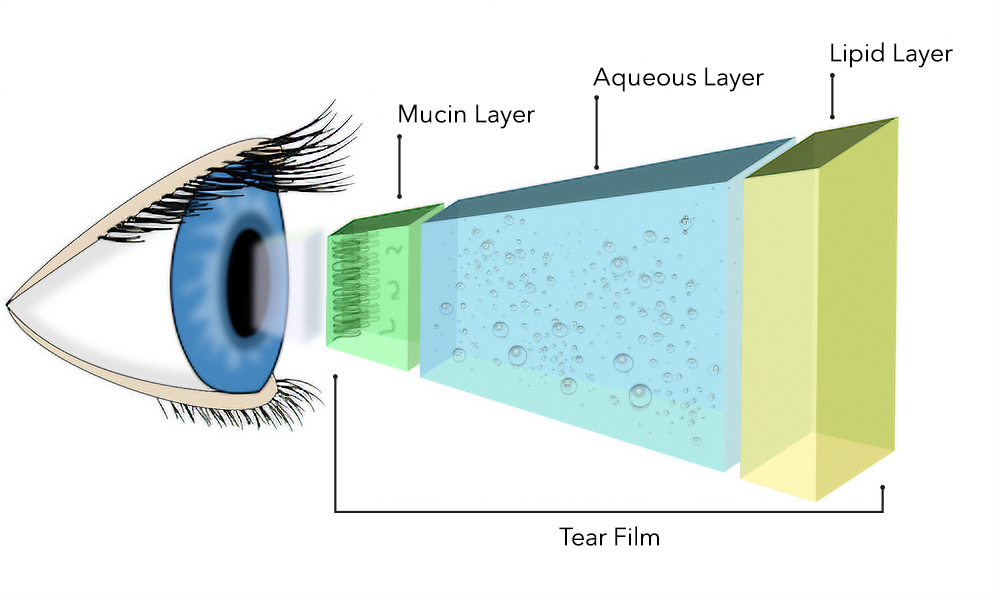
There are two types of dry eye disease:
Some people have aqueous tear deficiency and tear instability.
Dry eye disease is a pathological condition which is why it is classified as a disease; Dry eye involves many eye surface changes caused by tear dysfunction.
D.E.D. CANNOT BE CURED BUT MUST BE CAREFULLY MANAGED
• Stinging
• Burning
• Scratchy sensation
• Watery eyes
• Light sensitivity
• Red eyes
• Stringy mucus
• Foreign body sensation
• Difficulty wearing contact lenses
• Difficulty with night vision
• General fatigue or blurred vision
• Natural ageing changes
• Using devices
• Contact lens wear
• Eye surgery
• Some eye conditions
• Rheumatoid arthritis
• Diabetes
• Hormonal imbalances
• Skin conditions
• Certain medications
• General fatigue
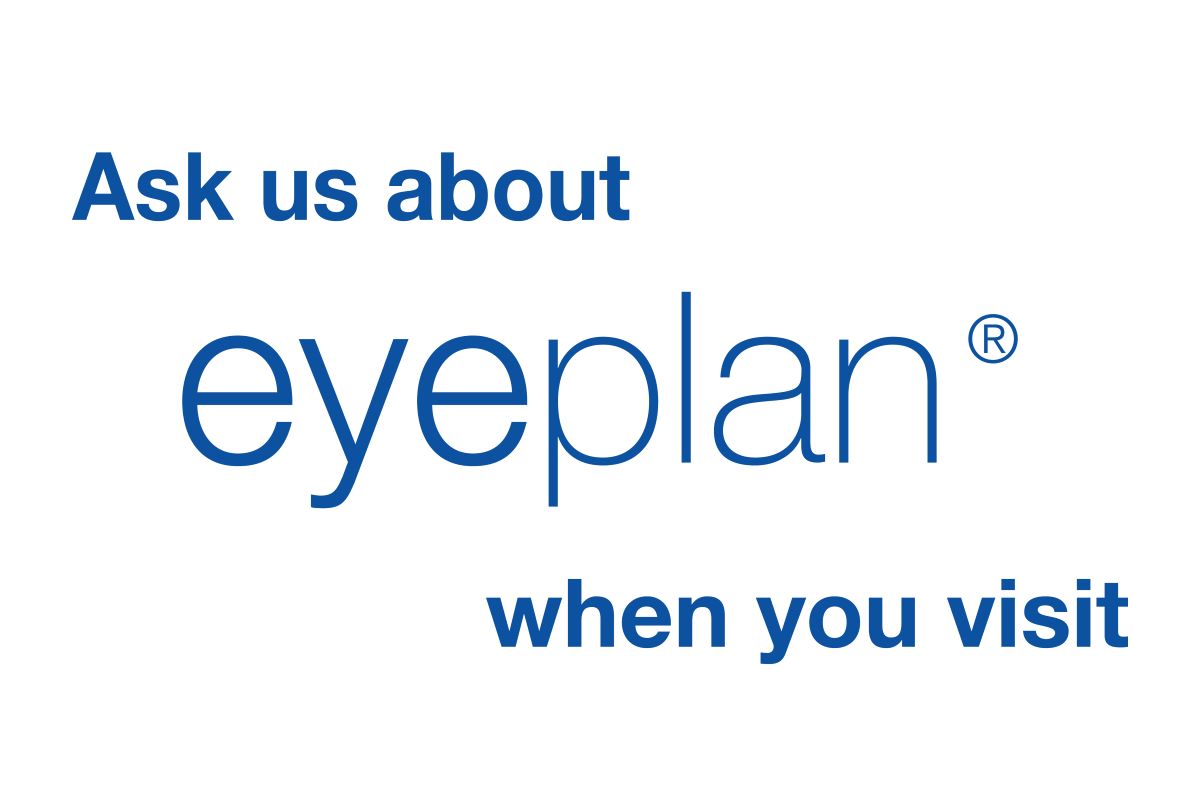
We all know how important it is to look after our eyes; after all, we only have one pair and they need to last our lifetime.
Eyeplan is a comprehensive eye care package designed to provide you with access to the very best of eye care at an affordable price.
As a member of Eyeplan, you are entitled to a series of benefits designed to take care of your eye health and what’s more, we can open up a whole new world of innovative designer frames and lenses at excellent prices – as many as you want! Just look around our practices to see the savings!
You’re registered as soon as your first payment is made. If you have a problem with your vision or eyes then don’t delay – have it checked out. You can also purchase anything you need from us at our very special prices.
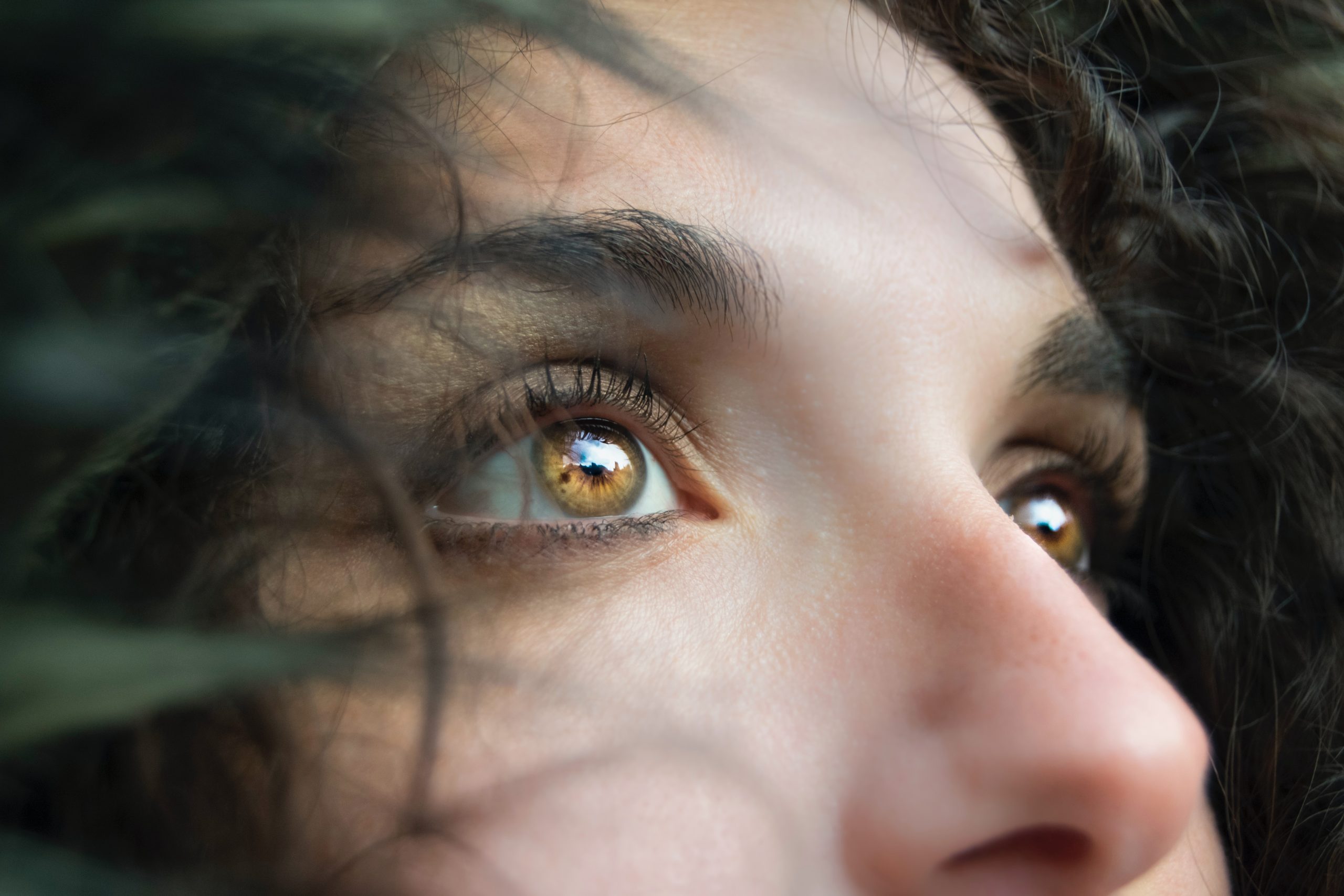
Group practices include:
• An annual full personalised eye examination including an OCT eye scan (where applicable). This offers a complete ocular health check and early detection for better protection against glaucoma, macular degeneration and other health conditions.
• Complimentary contact lens consultation, fitting and upgrade.
• Follow-up contact lens aftercare.
• 25% off complete glasses (including lenses).
• 25% off prescription and non-prescription sunglasses.
• 10% off all optical accessories.
• 10% off hearing aids.
• Interest free payments.
• Exclusive contact lens prices.
• Spectacles will be covered by the Eyeplan Accidental Damage Scheme (T&Cs apply).
Had an accident with your spectacles? No need to worry – your Eyeplan membership will look after you!
Any spectacles under two years old, covered by the Eyeplan Accidental Damage Scheme, will be repaired or replaced if you damage them accidentally. There is a small excess charge depending upon the nature of the damage and the age of the spectacles.
The monthly care fee is less you think.,
Single membership is £12 per month and families from £20 per month.
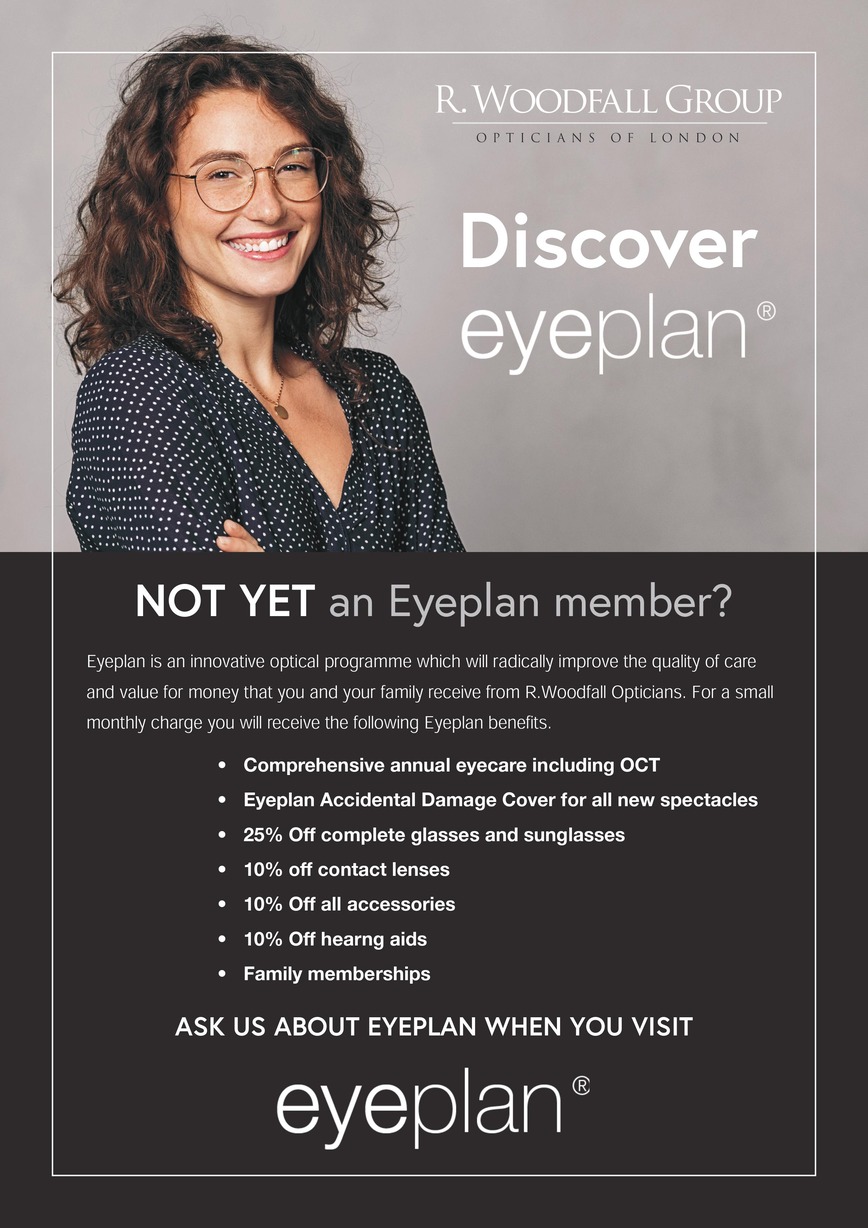

It’s important to protect your vision in bright sunlight – not only against glare, but also the hidden dangers of ultra-violet rays.
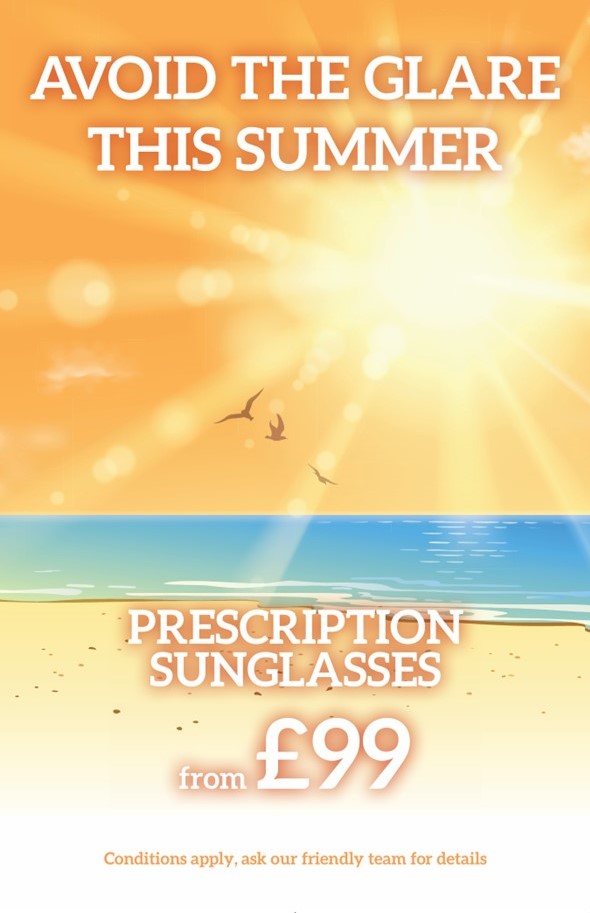
Over-exposure to UV light can damage your eyes as well as your skin. It may lead to cataracts and can prematurely age your retina, causing reduced vision in later life.
It’s therefore essential to choose sunglasses that are not only stylish but have optical quality lenses and a UV filter.
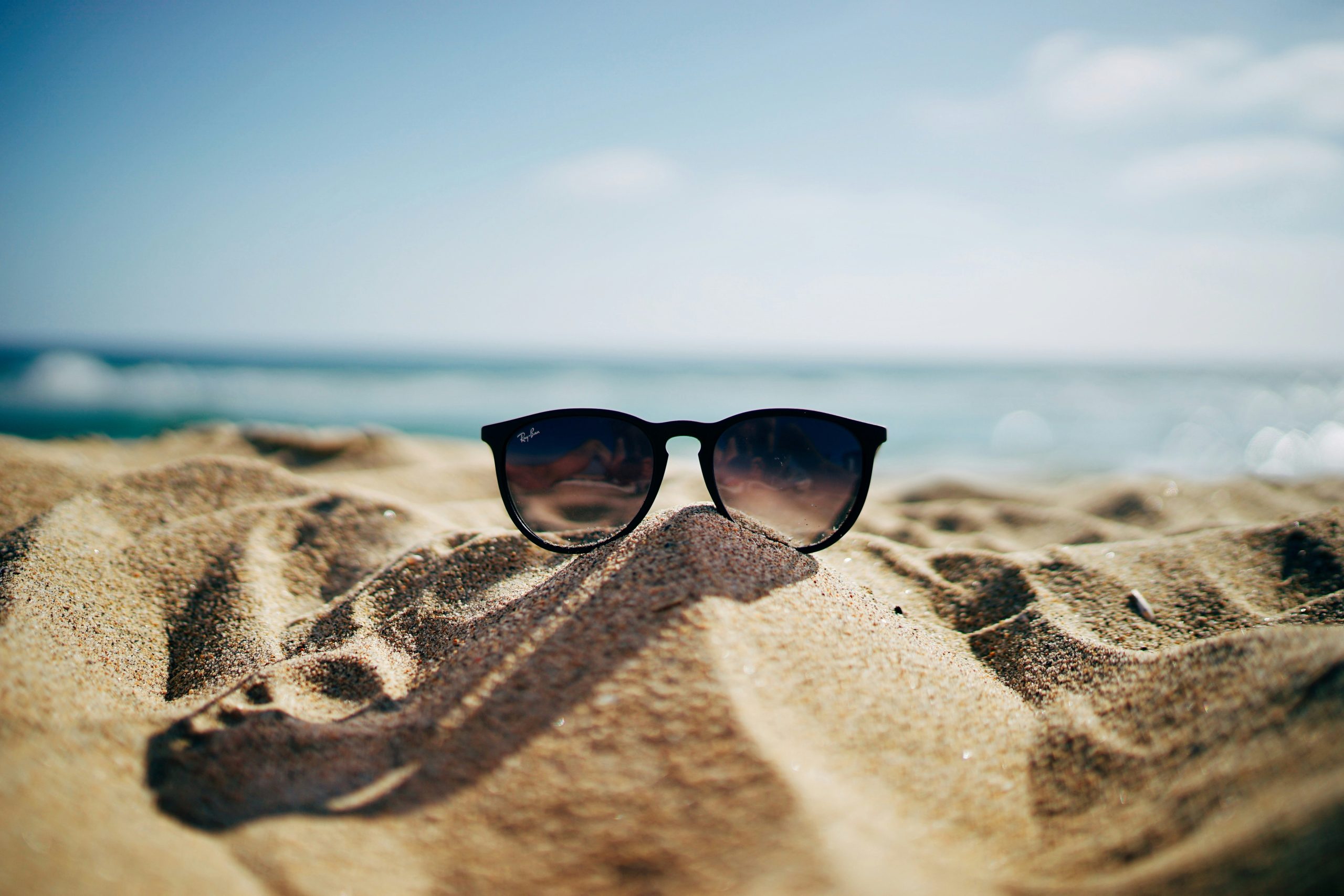

If you already wear glasses, you can still wear quality sunglasses. We stock lots of designer brands – from Maui Jim to Ray Ban – which can be made up to your individual prescription. They can carry single vision, bifocal or varifocal lenses. They are also available with photochromic lenses, which have a light tint indoors, yet darken in sunlight. Modern photochromic sunglasses are comfortable to wear because they are made with fast-reacting, lightweight plastic lenses.
Specific situations sometime call for specific styles of sunglasses. If you do a lot of driving, or are keen on sports such as golf, cycling or watersports, there are particular frames and lenses which would help you see clearer in sunlight.
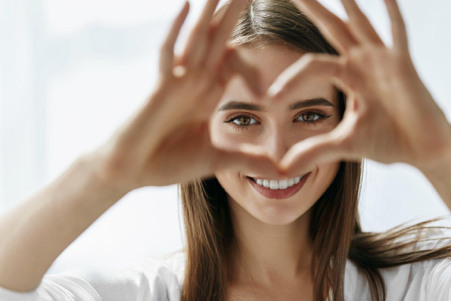
An eye examination could be the most important appointment of your year. If it’s your first one, let us talk you through it.
Whether you’re born short-sighted or you can still see high aircraft clearly well into your 70s, everyone’s eyesight deteriorates over time. If you think you’ve reached the point where your sight is starting to affect your daily life and are, understandably, unsure of the latest options on offer, we hope this regularly updated step-by-step guide will answers a few questions.
It goes without saying we all want to look great in our new specs or contact lenses (and we can certainly help you with this) but let’s talk about your eye health first.
If you can’t find what you need here, don’t hesitate to drop us an email and we’ll get back to you within a day or two. Or give us a call – our details are in the Contact Us section.
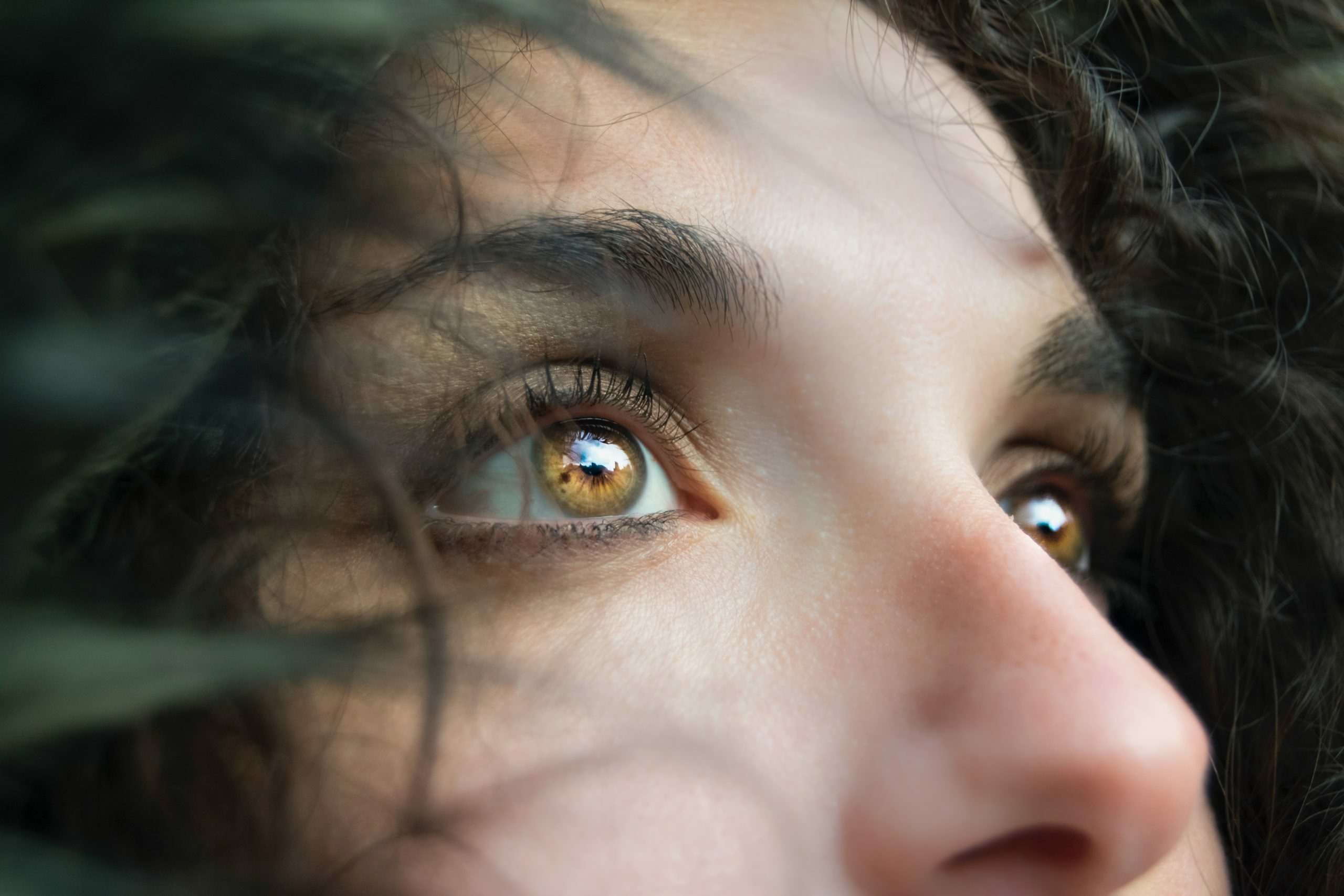
There’s more to an eye examination than simply checking your vision. We also investigate the health of your eyes. This is important because serious eye conditions such as glaucoma and macular degeneration, and even general health problems like diabetes and high blood pressure, may be hidden and not show any symptoms. Yet they can be detected during an eye examination and the sooner a potential problem is diagnosed, the greater the chances are of it being treated successfully.
After the examination, we’ll talk you through your vision and eye health and give you a copy of your optical prescription. We try and keep things in plain English, but if anything is unclear (this is medical science after all!) make sure you ask questions. Or contact us at later date if you have any nagging concerns.
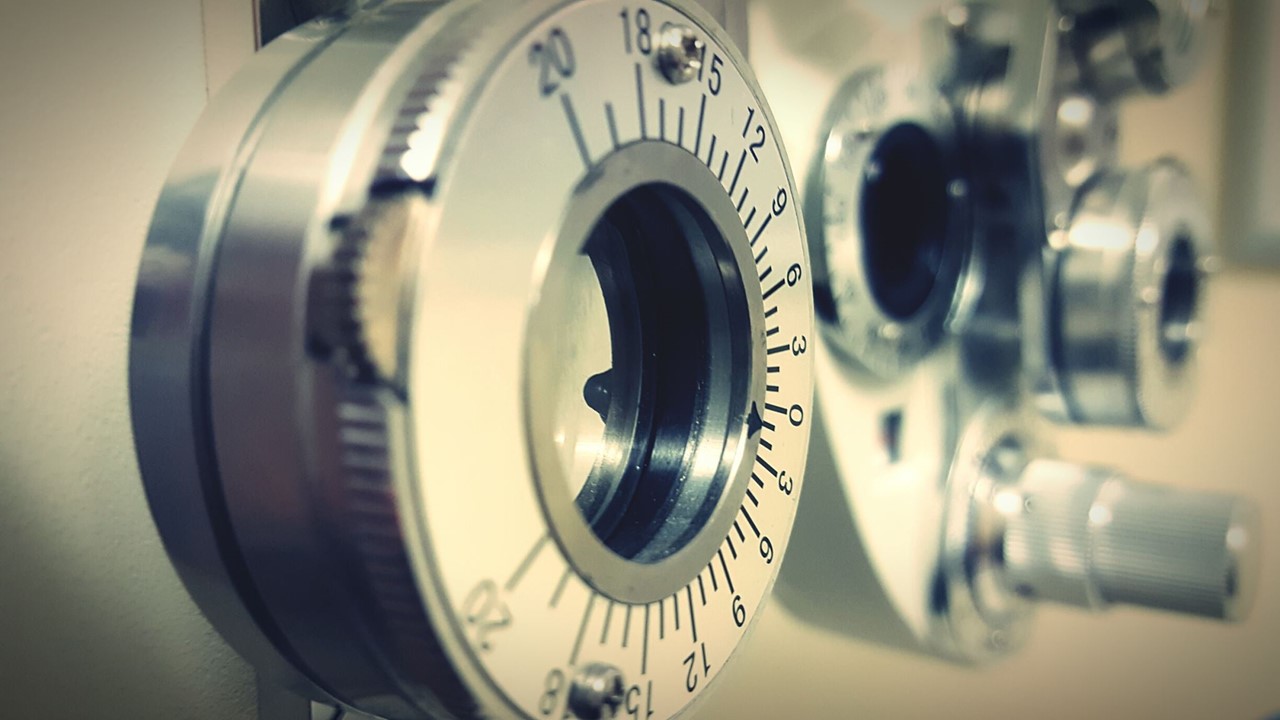
Regular eye examinations are especially important once you enter middle age. That’s 40 onwards, in case you were wondering!
Many people in their mid-40s find they need glasses for reading, while nearly everyone will have spectacles by the time they’re 65. In later life, you’re also more likely to experience a medical problem that affects your vision. Glaucoma typically affects those over 40, while cataracts and macular degeneration mainly occurs in the over-60s.
It’s because of this that annual eye examinations are advisable for older people – and for children as well.
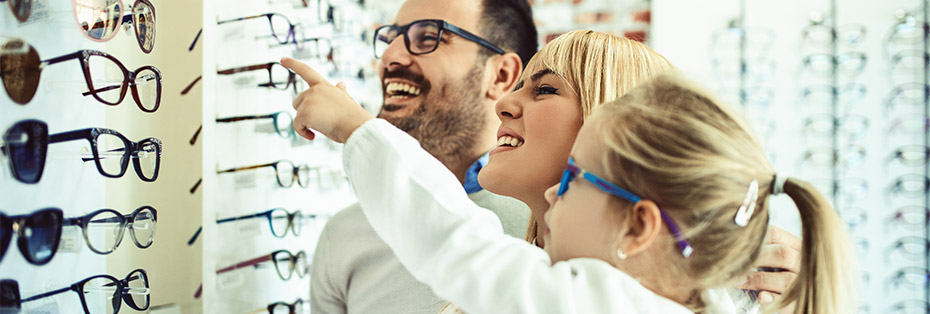
You qualify for a free NHS-funded sight examination if:
You are also entitled to a free NHS eye exam if you:
If you are named on an NHS certificate for partial help with health costs (HC3) you may get some help towards the cost of your eye examination.
OCT is the very latest in optical technology based on a camera which, through a non-invasive, non-contact examination, creates a 3D model of your eye and your optic nerve. Similar to a regular eye test, it will identify the early stages of disease (or track the results of treatments you have received previously).
As well as being more precise than traditional retinal photography, the bespoke models of your eye also mean that we will be able to prescribe some of the latest contact lenses which will fit more snugly to the contours of your cornea.
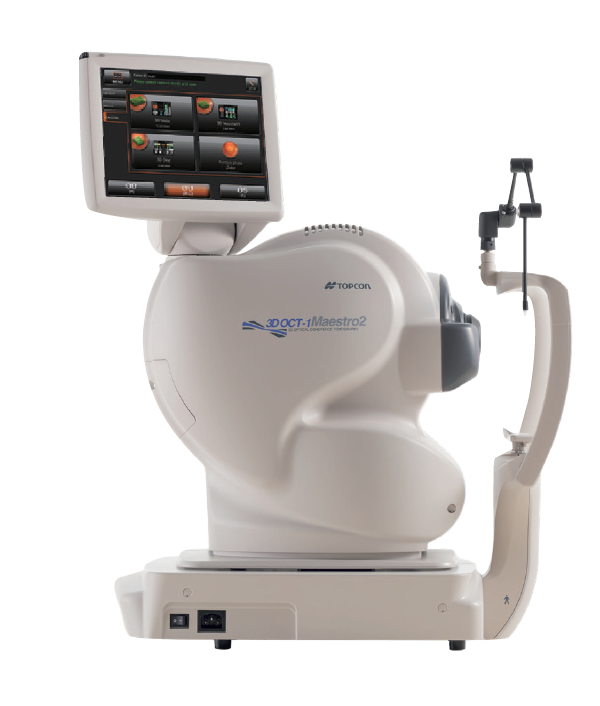
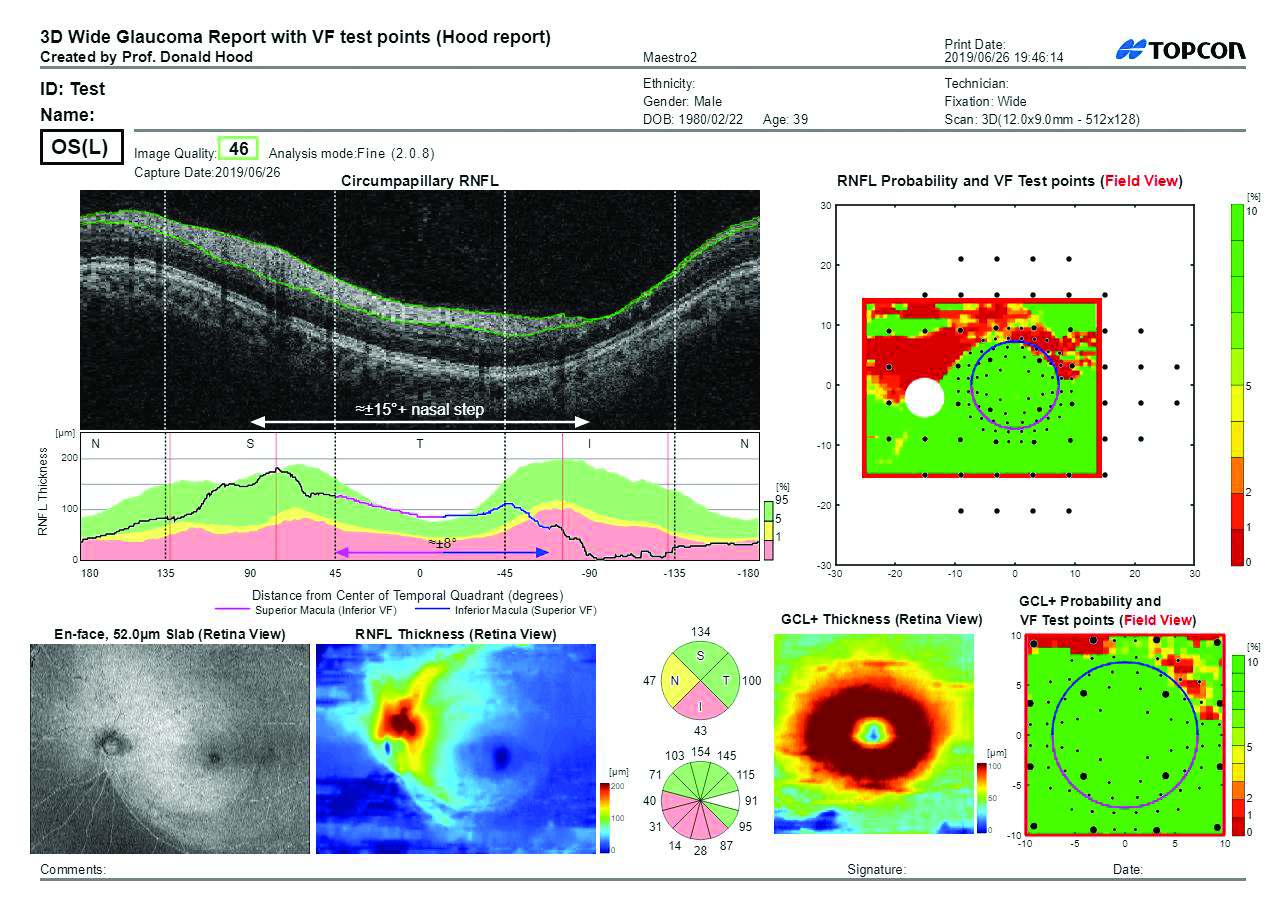
Optomap is the only scan that captures more than 80% of your retina in one panoramic image. The unique Optomap ultra-wide view helps detect early signs of retinal disease more effectively and efficiently than with traditional eye exams alone.
The exam is fast and pain-free and nothing touches your eye.
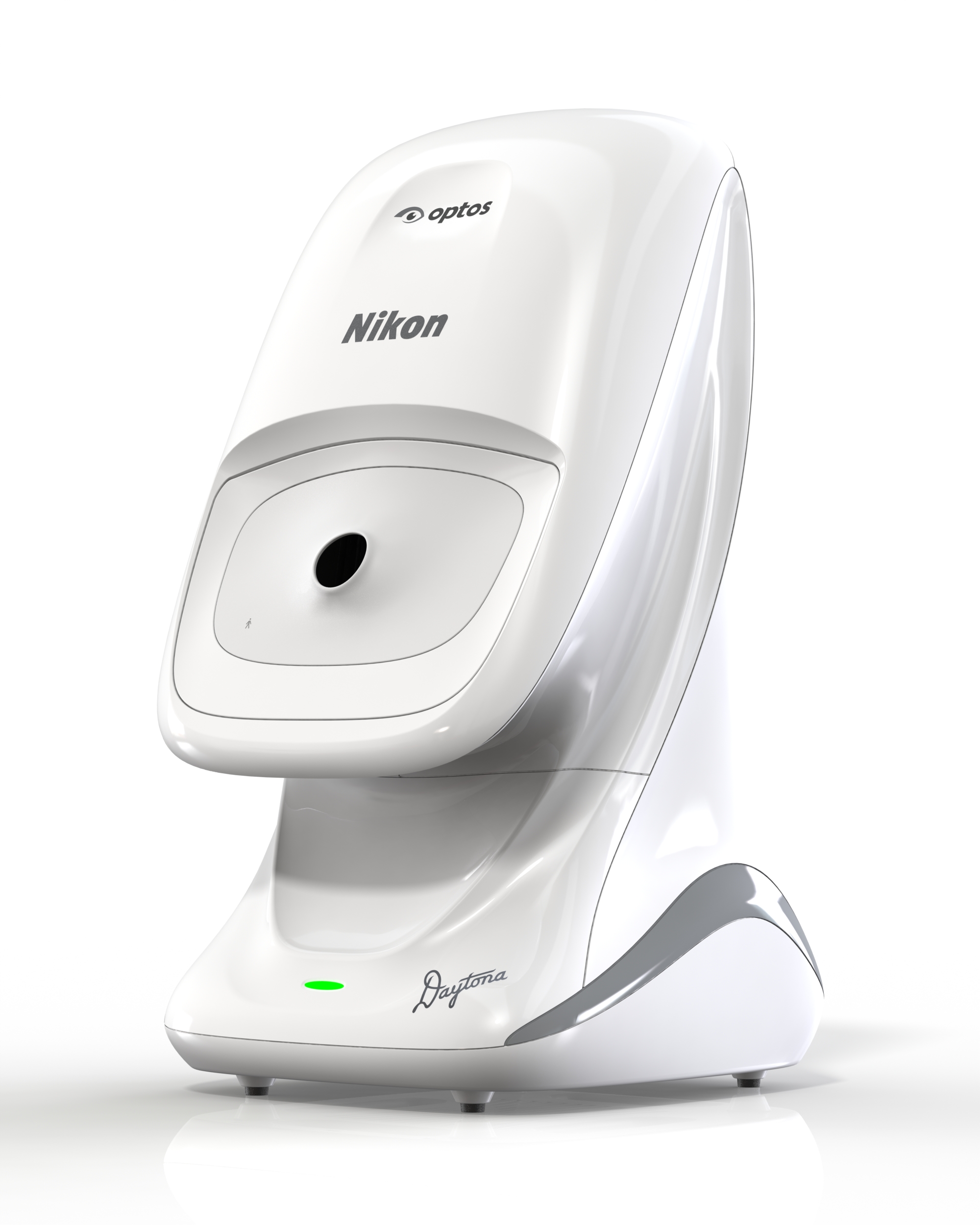
The benefits of having an optomap ultra-widefield retinal image taken are:
– optomap facilitates early protection from vision impairment or blindness
– Early detection of life-threatening diseases like cancer, stroke, and cardiovascular disease
The unique optomap ultra-widefield view helps your eye care practitioner detect early signs of retinal disease more effectively and efficiently than with traditional eye exams.
Early detection means successful treatments can be administered and reduces the risk to your sight and health.
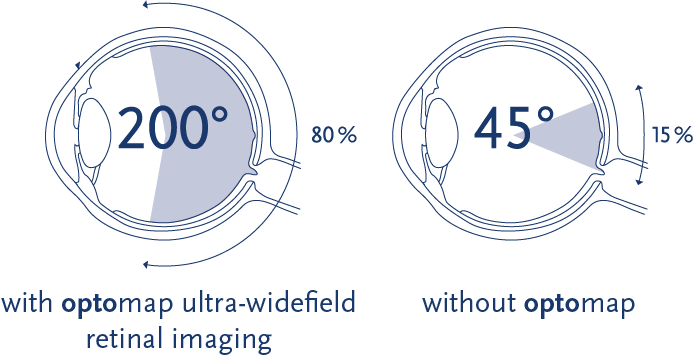
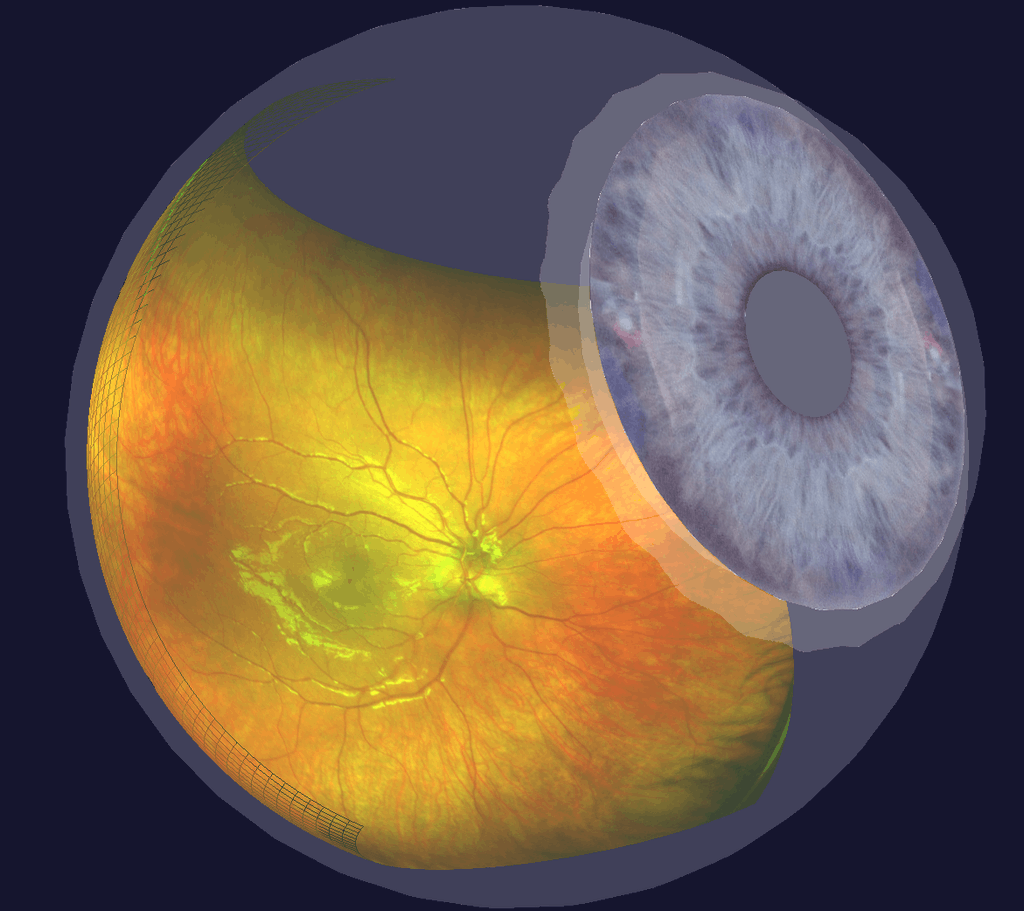
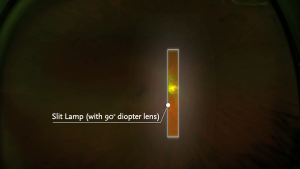
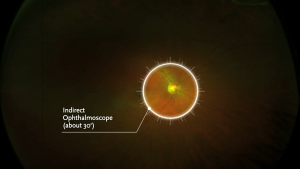
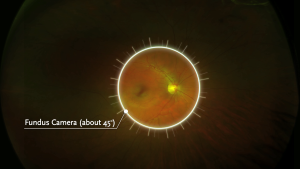
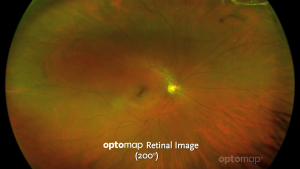

Here at the R Woodfall group of opticians, the Optometrist who tested your eyes will hand you over to one of our qualified Dispensing Opticians who will be able to offer you the best possible advice when it comes to choosing a new pair of glasses (or contact lenses).
Your choice of frame needs to be right for you. It should complement both the shape of your face and your skin tone. Additionally, you may need to take into account your prescription and the type of lenses you require. This can add up to a daunting decision.
We always try to give you the best possible advice whilst respecting your budget.
We stock a large range of frames – some from well-known designers and some really interesting ‘not so well known’ brands. Quality is always important to us. In fact, all our frames come with a minimum of a one-year guarantee.
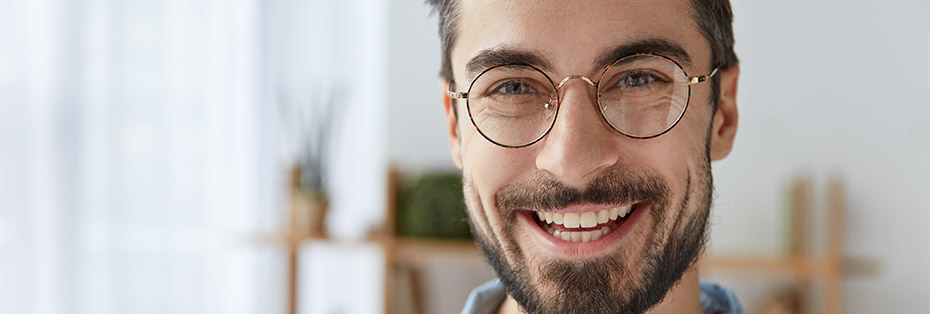
As independent opticians we are able to prescribe lenses from all manufacturers to suit your choice of frame and budget – we aren’t tied to any particular make. Our Dispensing Opticians have an in-depth knowledge of both the latest frame and lens designs available on the market today.
Lens design is evolving all the time. There are now thinner, lighter lenses and anti-reflection coatings available that are guaranteed for two years. There have also been significant improvements in the design of varifocal lenses (if you need help with reading and driving for instance), such as personalised lenses designed specifically for your prescription.
There are also special lenses designed for most sport. So, if you ‘re partial to a spot of cycling, skiing, diving – anything really – then we can help you enjoy your passion a little more.
There are also vocational lenses available for computer use – which offer greater comfort if you are in front of a screen all day.
We’ll be more than happy to spend time discussing the choices with you.
If you need both near and distance vision correction, then you are probably presbyopic – a condition which most people experience from their mid-40s onwards. The traditional solution is to use bifocals, but these have a sudden change in focus and a visible line across the lens.
Varifocal lenses are an increasingly popular alternative. Because they have a gradual change in their optical power, there is no disconcerting jump between your reading and distance vision. As a result, varifocal lenses give you better middle-distance focus. Losing the bifocal dividing line also makes varifocals look more attractive. The newest design of varifocal will offer you as close to natural vision as possible in a varifocal and is the very best in multifocal technology.
Most lenses can now have special coatings applied which enhance your vision and also improve the appearance of your glasses. Particularly popular are scratch-resistant and anti-reflection coatings.
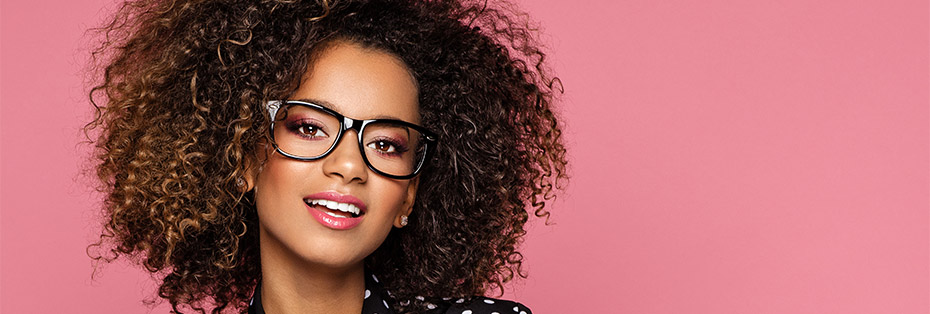
A scratch-resistant coating will prolong the life of your lenses as it protects against everyday wear and tear. An anti-reflection coating virtually eliminates the light reflected from the surface of your lenses. Not only will this make you look better (especially as there are no reflections to get in the way of eye contact) but it will also help when driving at night because it reduces glare from oncoming headlights.
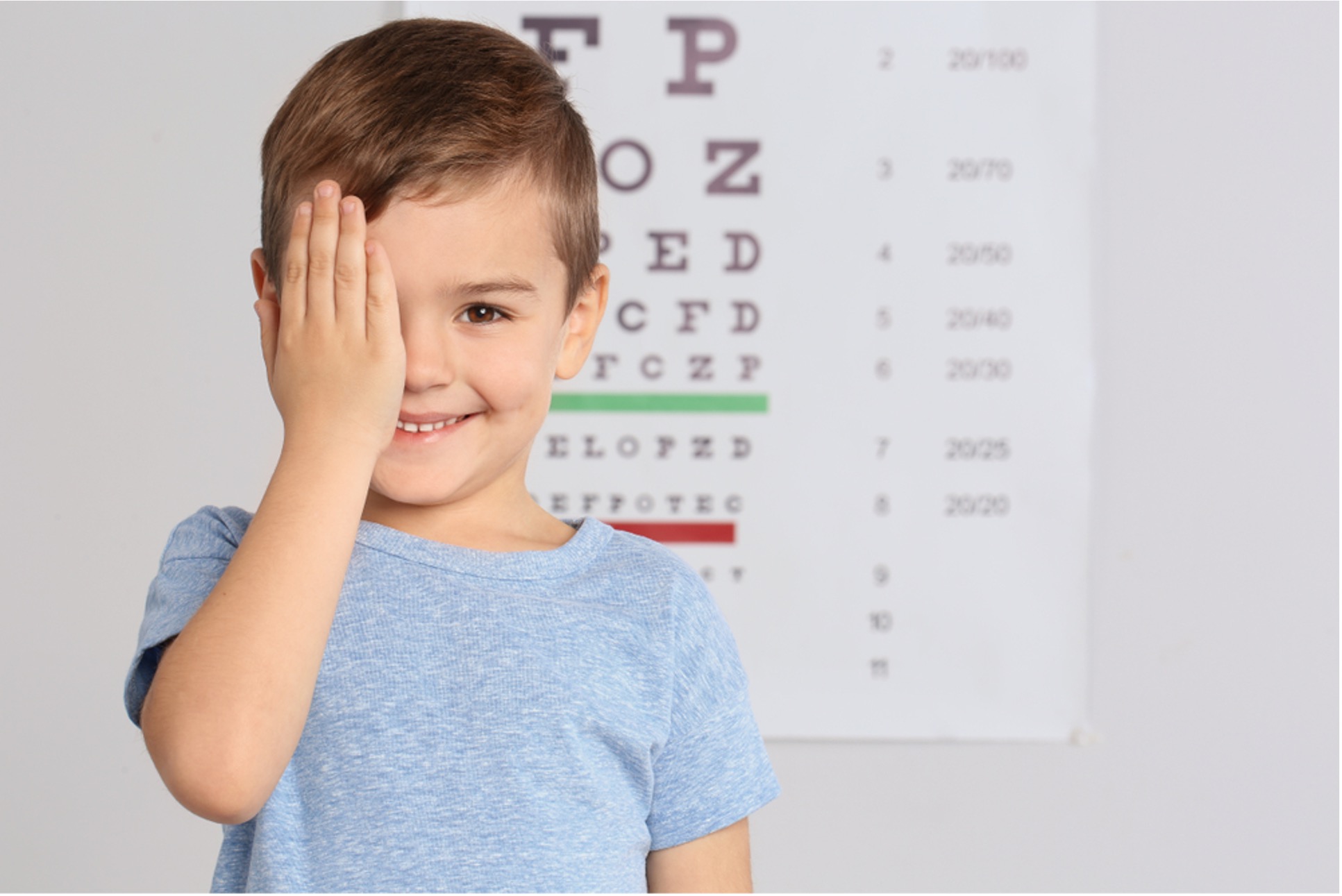
It is recommended that children should have their first eye examination before they start Primary School. It’s also really important that children are tested regularly as they are less likely than adults to notice that there is a problem with their sight. We can advise on how regularly after the first examination.
Research shows that one in five children has an undetected eye problem which directly impacts their ability to reach their full potential.
Should they need glasses, we have a wide selection of children’s frames designed specifically for young faces. Many have soft nose pads for extra comfort and spring hinges to stand up to the rough and tumble of the playground.

Is there a charge for children’s eye examinations?
Children’s eye examinations are available on the NHS for everyone under 16 (or under 19 if in full time education). If your child needs glasses, there is also an NHS contribution to the cost. We have a selection of frames which are covered by an NHS voucher.
What happens if my child doesn’t know their letters or isn’t able to talk?
We can examine your child’s vision using a range of alternative test charts, our optometrists are experienced in dealing with children, however we cannot perform examinations on children under the age of three and recommend you seek advice from your GP if you are concerned about any vision issues, as a referral to a paediatric specialist may be required.
We also encourage parents or guardians to participate in their child’s exams, as the more you understand about their prescription and the various solutions on offer, the more you’ll be able to help them in the long-term.
What are the signs of eye problems in children?
There are many warning signs but the main ones are:

Will I be able to accompany my child during their eye examination?
Yes. If your child is under 16 it is a legal requirement that a parent or guardian accompanies them in the examination room.
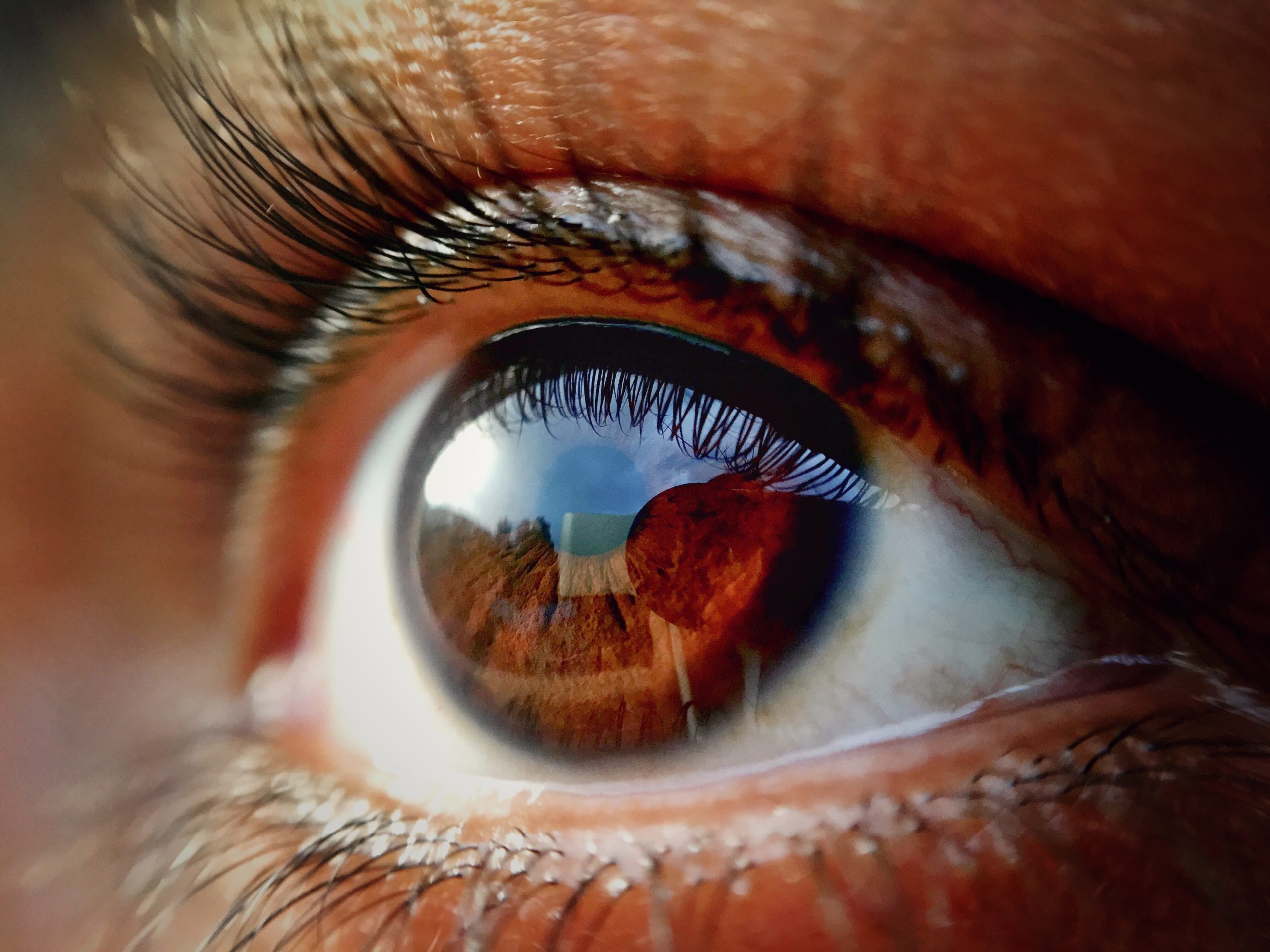
Our specialists in contact lens fitting can provide you with lenses to wear full time or for occasional wear.
Modern contact lenses are very versatile and suitable for most people. The best way to find out whether you are able to wear contact lenses and/or which contact lenses would suit your individual requirements is to make an appointment with one of our contact lens opticians or optometrists. They will examine your eyes and will talk you through which type of lens would work best for your vision and lifestyle requirements.
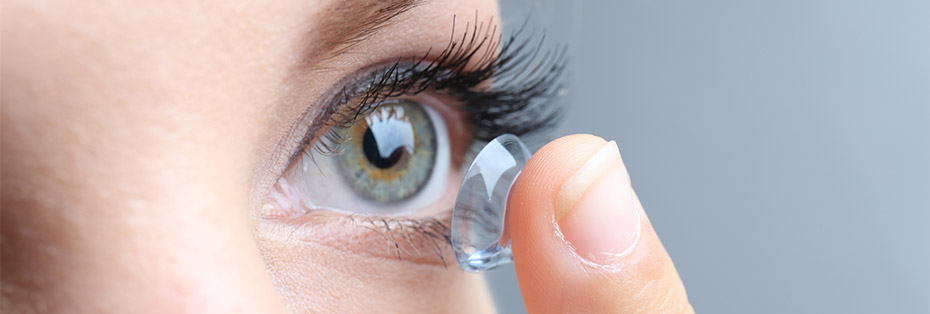
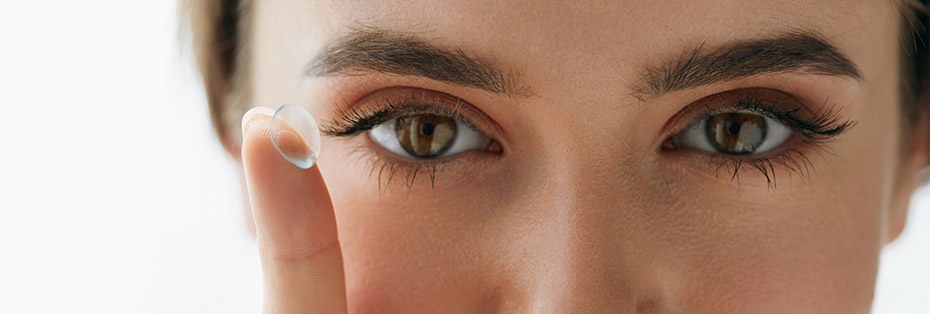
It is essential that regular contact lens check up appointments are adhered to, these ensure that your eyes remain healthy as well as maintaining optimal clarity with your contact lenses. Regular check ups reduce the risk of contact lens related problems.
All of our lenses can be supplied through Eyeplan, our direct debit scheme. This spreads the cost with manageable monthly payments and also entitles you to special discounts only available to Eyeplan members. You will also be able to buy your spectacles and sunglasses at a 25% discount, as well as lower costing contact lenses.
Eyeplan:
First visit – Anterior (front of eye) health assessment and topography (simple and painless corneal mapping).
Second visit – Collection of ortho-K lenses, insertion and removal instruction and book follow up appointment.
Third visit – Morning after first night of wear, check vision changes and corneal health.
Fourth visit – One week after previous visit, check vision changes, corneal health and re-take topography.
Fifth visit – One month after wear started. Check vision, corneal health and topography.
Please note, on occasion we may need to refit the lenses during the fitting process. Following visit five we will see you after the first three months then the next three months, then every six months thereafter, where a new pair of lenses will also be supplied.
New patient:
Existing Eyedream user from another Optician
Existing ortho-K wearer from another Optician using an alternative design to Eyedream
Please note: In these instances we are purely the supplier of the product
Existing ortho-K Px from alternative supplier, changing to Eyedream
Here at R Woodfall Opticians, we are proud to be working together with The Hearing Care Partnership to offer hearing care services to our patients. You can now book a range of hearing appointments at our practices.
Did you know?
Our full hearing care service includes everything from free hearing assessments, the latest hearing aids, ear wax removal, hearing protection services and free tinnitus consultations.
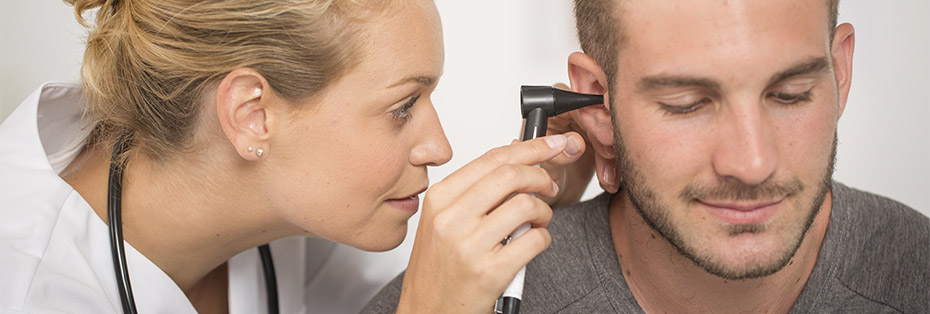
Hearing assessments are completely free with The Hearing Care Partnership. You’ll be looked after by one of our fully qualified audiologists, who will carry out a comprehensive evaluation of your hearing. Find out more here.
You can call your local practice or visit The Hearing Care Partnership to book online HERE.
Depending on the outcome of your hearing assessment, you may be recommended hearing aids or given other hearing care advice and support.
You can have an ear wax removal appointment with one of our fully qualified audiologists, using the latest and safest methods, ensuring you’re comfortable and not in pain.
There’s no time restrictions on your consultation and the ear wax removal service also includes a quick hearing health check. Find out more here.
The Hearing Care Partnership offers the very latest in hearing aids from the world’s leading hearing aid manufacturers. There is a huge variety in modern hearing aids so you can get the perfect aid to suit you. Some can be invisible or hidden and are incredibly discreet, while others pack a lot of technology into a tiny device so you can hear everything from chirping birds to your Bluetooth connected mobile device.
Features can include rechargeable batteries, Bluetooth connectivity and can even be compatible with your smartphone. Explore hearing aid technology here.
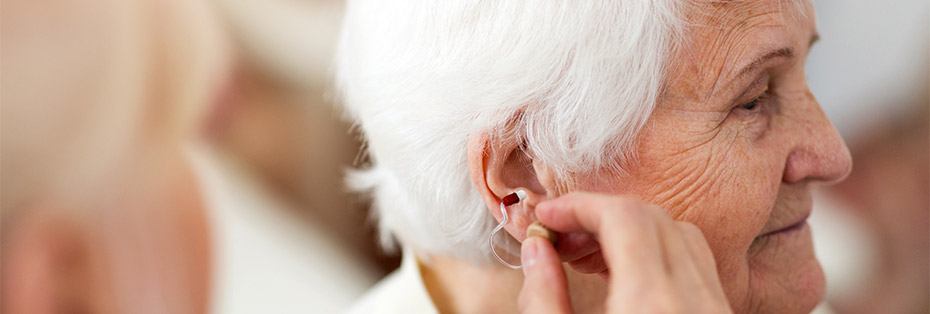
Tinnitus affects 6 million people in the UK alone. The condition can be referred to as “ringing in the ears” but can also sound like chirping, hissing or roaring and unfortunately, there is no known “cure”. However, we can help you to find effective ways to manage tinnitus so you can continue to do all the things you love to do. Recommendations can include sound therapy, cognitive behavioural therapy (CBT) and even hearing aids.
Our tinnitus consultations with The Hearing Care Partnership are free of charge. Find out more.
While regular hearing health checks are vital, hearing protection is also important – especially if you enjoy live music or have some loud hobbies!
The Hearing Care Partnership offers a complete range of hearing protection services, including ear plugs for sleeping, swimming, motorsport, shooting and more, to help protect and preserve your hearing.
Find out more about hearing protection.
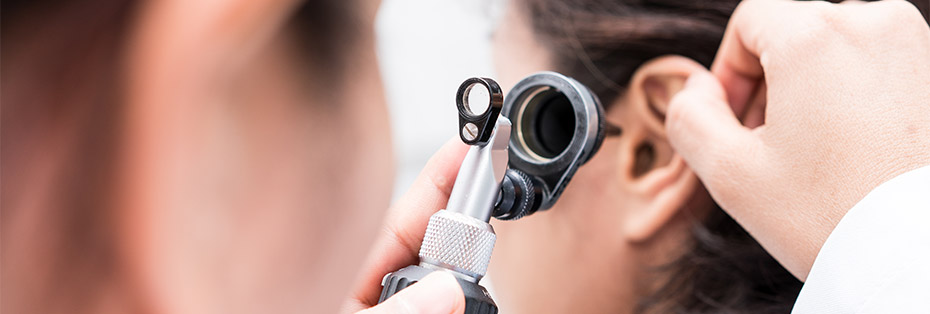
To find more information about all our hearing services, please visit The Hearing Care Partnership website.
To make an appointment with our audiologist, you can book online HERE or call your local practice:
[1] Hoffman, Dobie, Losonczy et al. “Declining Prevalence of Hearing Loss in Adults Aged 20 to 69 years” 2017.
[2] Chia,E; Arch. Opthamol. 2006
[3] Action for Hearing Loss, Facts and Figures. 2020
[4] Action for Hearing Loss, Facts and Figures. 2020
Please feel free to link to any of these pages or the articles on them individually. Any of the articles and blogs can also be used as social media content as needed.

Optical science advances at a rapid rate and this can mean enormous benefits for your eye health. We are delighted to be able to offer enhanced eye examinations at four of our practices, using state-of-the-art OCT cameras.
OCT (Optical Coherance Tomography) is a completely painless and highly advanced imaging system that checks for potentially serious conditions such as glaucoma, diabetes, age-related macular degeneration, vitreous detachments and more.
The OCT camera is an advanced eye scan for people of all ages. Similar to ultrasound, OCT uses light rather than sound waves to image the different layers that make up the structures at the front and the back of your eye. The OCT machine captures both a photograph and a cross-sectional scan of the eye at the same time. This allows both instant and early diagnosis of a number of common ocular conditions. The scan is non-invasive, painless, simple and quick. What’s more, the software can automatically detect even the most subtle changes to the retina with every eye test you have. This gives you an invaluable ongoing record of the health and condition of your eyes.
Common conditions identified through regular OCT screening include:
Optomap is the only scan that captures more than 80% of your retina in one panoramic image. The unique Optomap ultra-wide view helps detect early signs of retinal disease more effectively and efficiently than with traditional eye exams alone.
The exam is fast and pain-free and nothing touches your eye.
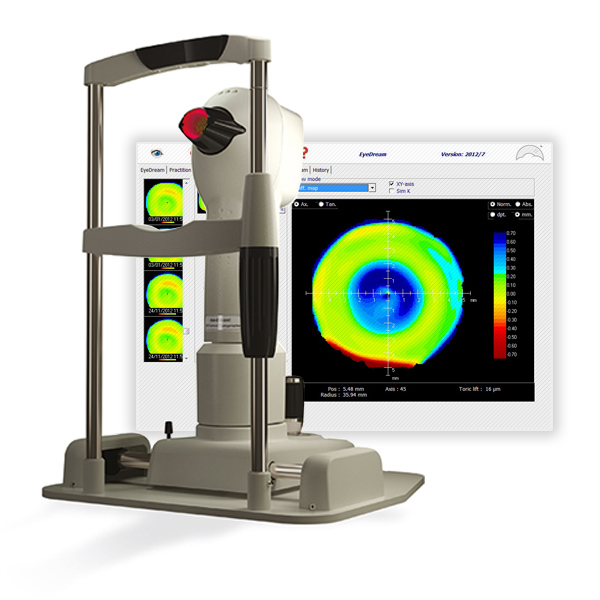
Ortho-K is a way to correct myopia (short-sightedness) without an operation and is fully reversible.
Special hard contact lenses are worn overnight to correct the vision. The lenses are removed in the morning for clear, natural vision during the day.
Ortho-K can help anyone suffering from short-sightedness (up to the prescription below) to see clearly without glasses or contact lenses during the day, but can be especially useful for:
Ortho-K is able to correct the following degrees of short-sightedness:
It’s also completely safe for children, although we would advise you to wait until the child is able to insert and remove the lenses themselves.
A full eye examination is carried out, followed by detailed measurements of the eyes using specialist equipment. We then order the lenses from the laboratory. Once the lenses arrive an appointment is arranged to check the fitting. We will also give you instructions on inserting and removing the lenses.
The lenses are worn overnight and an appointment follows the next morning to assess the eyes and the lenses.
A few days later another appointment is scheduled. By this time, most people are seeing well without their normal spectacles. After 10 days your vision is re-assessed. Normally, it will be fully corrected.
Usually, you would have appointments one month and then three months later. After that, appointments are every six months.
If any problems occur, we would be happy to see you for a special appointment.
We offer a FREE, 30-minute introductory chat – where we can talk about your suitability and answer any questions you may have.
An initial (non-refundable) fitting fee of £250 is charged, which also covers up to a maximum of seven appointments, as necessary. A direct debit monthly fee of £50 is then charged (starting a month after fitting) which covers:
New lenses are supplied every six months and you are generally committed to a minimum twelve-month contract.
Yes, once the effect is complete you simply remove the lenses each morning and you can see normally throughout that day. Also, you will be able to see clearly with the lenses in, when you wake up in the morning!
After the first night’s wear, your vision will be blurred with the lenses IN. The vision is clear when the lenses are removed.
It takes successive nights to fully correct the prescription. The lower the prescription the quicker it is achieved but normally, within a week, your sight during the day will be ‘treated’ and you will no longer be reliant on glasses or contact lenses.
Yes. Research and experience show that the whole process is totally safe and 100% reversible. So, if you decide to stop wearing the Ortho-K lenses for any reason, the eye will return to its original shape and you will see clearly with your glasses again.
The lenses are made of the very highest oxygen permeable materials, for maximum comfort and safety during overnight wear.
You may also find it helpful to visit www.orthoklenses.com.
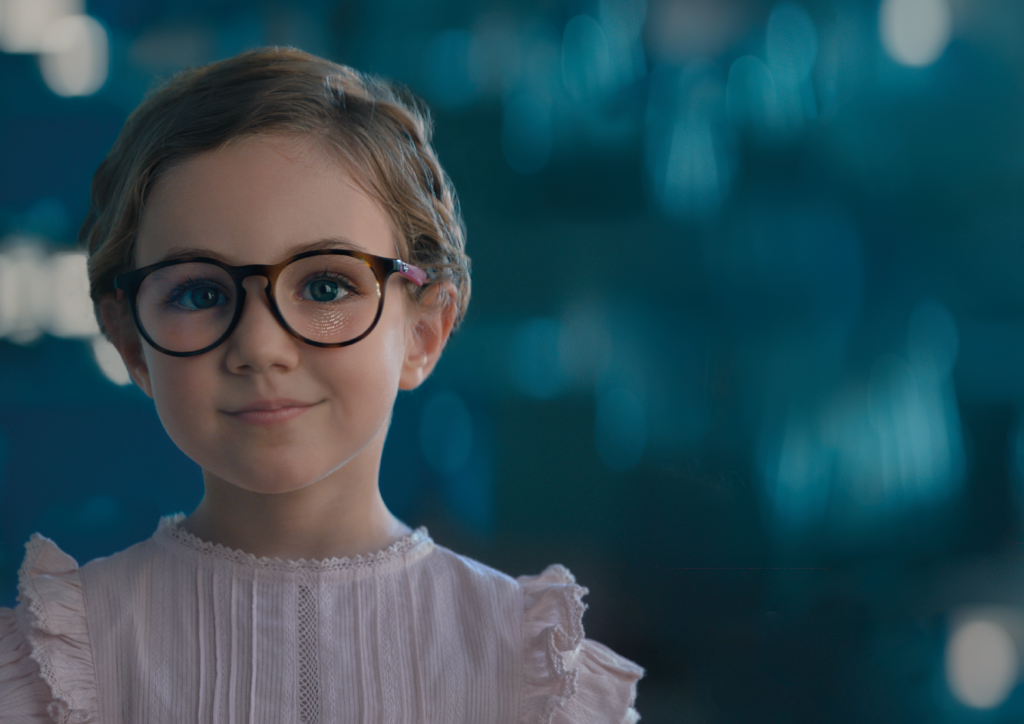
Myopia, also known as short-sightedness, is an eye health issue that every parent should be aware of. Over one-third of the world’s population has myopia, and this is projected to increase to 50% by 2050.
Whether you suspect that your child is myopic, or you have little to no knowledge of the condition, we will help you support your child and manage their vision.
Short-sightedness usually starts in children from age 6 to 13. It can also happen in adults.
Signs you or your child may be short-sighted include:
Short-sightedness often runs in families, so you may have relatives who are also short-sighted.
It can get worse until the eye has stopped growing, at around 20 years of age.

Myopia is blurry long-distance vision, often called “short-sighted” or “near-sighted”. A person with myopia can see clearly up close – when reading a book or looking at a digital device – but words and objects are blurred in the distance, for example, watching television or when driving.
This is commonly because the eye is longer than usual from front to back, which causes light to focus in front of the back of the eye, and not on the back of the eye.
Myopia can be influenced by both environmental and genetic factors and is becoming increasingly prevalent.
The main concern is the exponential risks of developing sight threatening eye conditions such as myopic maculopathy, retinal detachment, cataract and glaucoma from high levels of myopia, most notably above -5.00.
The exact causes of myopia are not fully understood; however, genetics and environmental factors contribute to the development and severity of myopia.⁽ⁱ⁾
GENETICS
A child is at least twice as likely to be myopic with one myopic parent and five times likely to be myopic if both parents are myopic.⁽ⁱⁱ⁾
ENVIRONMENTAL
Research shows that not spending enough time outside contributes to the increased prevalence of myopia. Natural outdoor light can prevent the eye from lengthening.
EXCESSIVE USE OF SCREENS
Excessive screen time, for example watching TV, smart phones and tablets is not proven to increase myopia prevalence, but these activities have an impact on time spent outdoors.
TREATING OR SLOWING DOWN MYOPIA
Myopia is normally treated with glasses or contact lenses, or both. However, some treatments can slow down myopia progression, this is what we call MYOPIA MANAGEMENT.
Our accredited optometrists and dispensing opticians can offer you several options to slow the progression of myopia.
When myopia management is successful:
The results of myopia management may differ from person to person and depend on factors such as:⁽ IV,V,VI ⁾
EYEDREAM ORTHOKERATOLOGY
(ORTHO-K)
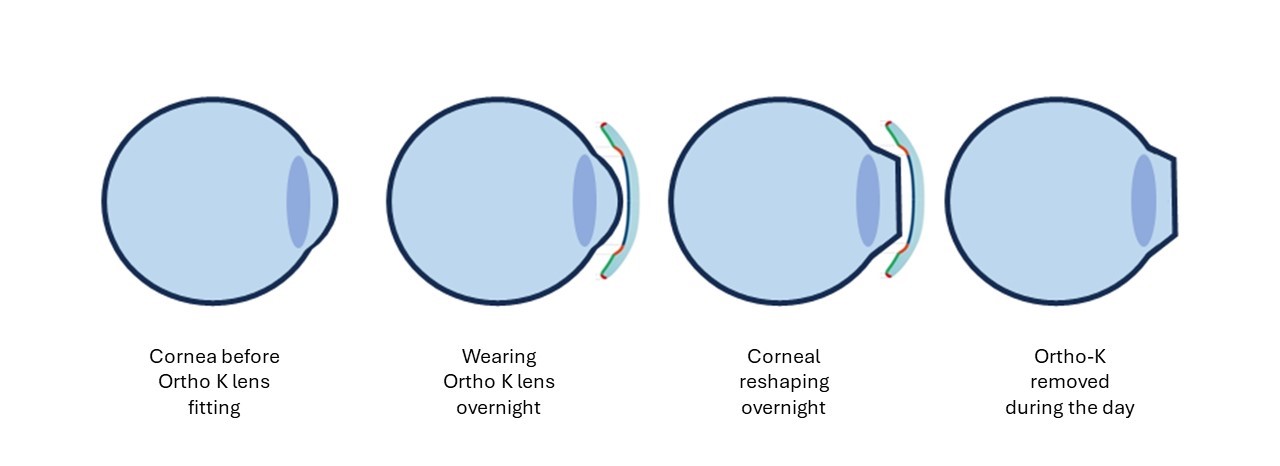
Specially designed rigid gas permeable contact lenses worn at night only, this safe and reversable treatment helps to alter the shape of the cornea during sleep.
EyeDream is a form of orthokeratology (ortho-K). These groundbreaking lenses are worn overnight to gently reshape the front of the eye. In the morning, the lenses are removed, and the wearer can enjoy crisp, corrected vision all day.
Ortho-k lenses offer children and parents an opportunity to slow the progression of myopia.
Ortho-K offers children the freedom and confidence to swim, play sports and enjoy an active lifestyle without the restrictions of spectacles or contact lenses.
Ortho-K lenses are worn at night and at home so lens wear and care can be monitored – and no more lost glasses or contact lenses!
Ortho-K treatment is effective, reversible and has proved life-changing for thousands of people.
MISIGHT 1-DAY DAILY DISPOSABLE CONTACT LENSES
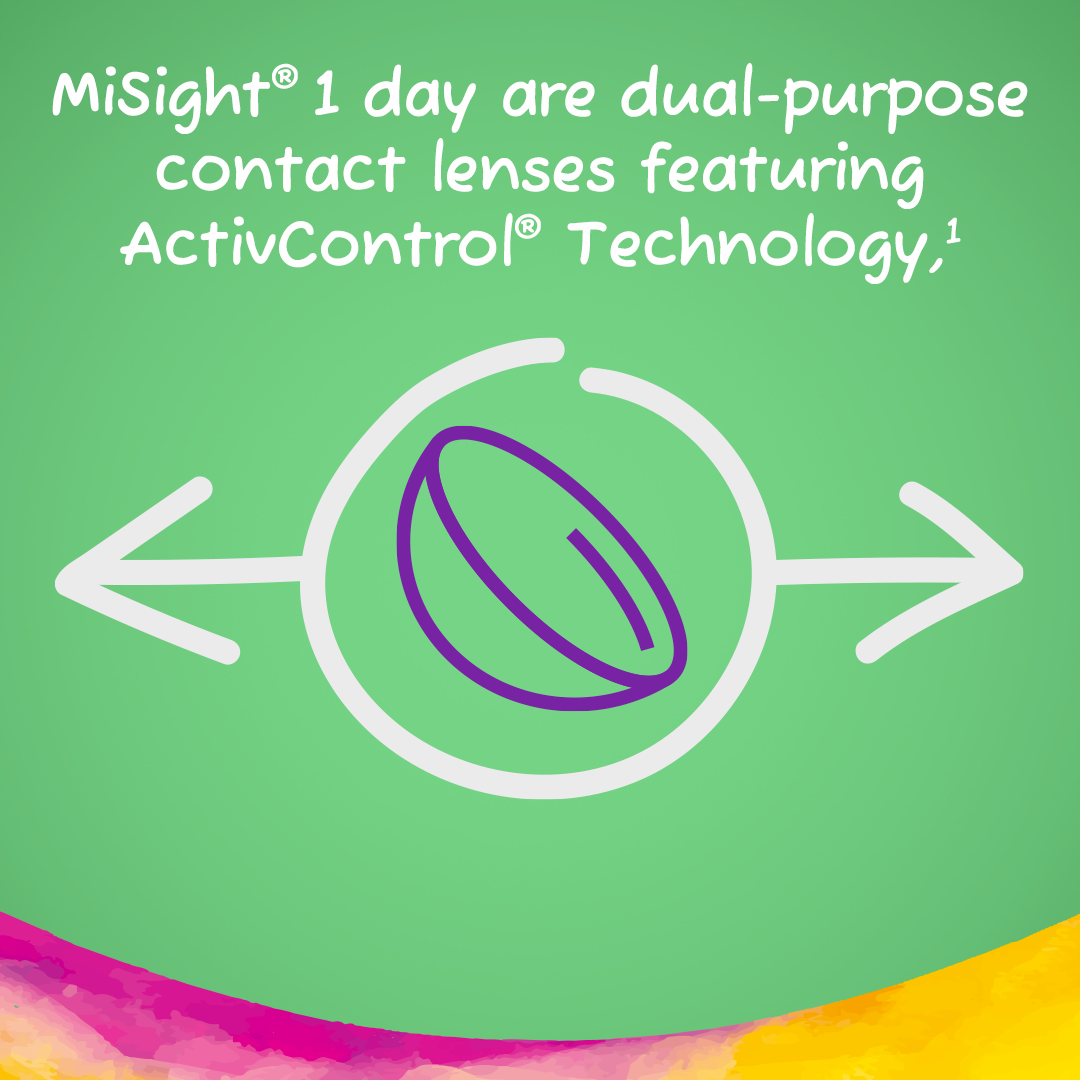
Daily disposable contact lenses suitable for children as young as 8 years old, worn as any other daily disposable lenses whilst slowing the progression of myopia.
MiSight® 1 day soft contact lenses from CooperVision provide clear, sharp vision and slow the progression of myopia.
Myopia management contact lenses are the perfect alternative to wearing glasses, easy to use, safe to wear with proven global results.
ESSILOR STELLEST SPECTACLE LENSES
Stellest™ lenses are Essilor®’s best solution to fight your child’s myopia, and their strong efficacy has been clinically proven, using patented technology to slow myopic progression.
Essilor® Stellest® slow down myopia progression by 67% on average* compared to single vision lenses, when worn 12 hours a day.
Essilor® Stellest® lenses create a signal in the eye that acts as a shield against myopia progression. Stellest® lenses are safe, aesthetic and simple.
Myopia may impact children’s well-being and development
Please ask one of our expert dispensing opticians for more details.
⁽ⁱ⁾The impact of myopia and high myopia: report of the Joint World Health Organization–Brien Holden Vision Institute Global Scientific Meeting on Myopia, University of New South Wales, Sydney, Australia, 16–18 March 2015. Geneva: World Health Organization; 2017. Licence: CC BY-NC-SA 3.0 IGO.
⁽ⁱⁱ⁾Jones L, Sinnott L, Mutti D, Mitchell G, Moeschberger M. Parental history of myopia, sports and outdoor activities, and future myopia. Invest Ophthalmol Vis Sci 2007; 48(8): 3524-3532.
⁽ⁱⁱⁱ⁾ https://www.brienholdenvision.org/news/item/95-changing-the-way-optometrists-think-about-myopia.html
⁽ IV ⁾ Wildsoet, C. F., Chia, A., Cho, P., Guggenheim, J. A., Polling, J. R., Read, S., … & Wolffsohn, J. S. (2019). IMI–interventions for controlling myopia onset and progression report. Investigative ophthalmology & visual science, 60(3), M106-M131.
⁽v⁾ Németh, J., Tapasztó, B., Aclimandos, W. A., Kestelyn, P., Jonas, J. B., De Faber, J. T. H., … & Resnikoff, S. (2021). Update and guidance on management of myopia. European Society of Ophthalmology in cooperation with International Myopia Institute. European Journal of Ophthalmology, 31(3), 853-883.
⁽VI⁾ Gajjar, S., & Ostrin, L. A. (2022). A systematic review of near work and myopia: measurement, relationships, mechanisms and clinical corollaries. Acta Ophthalmologica, 100(4), 376-387.
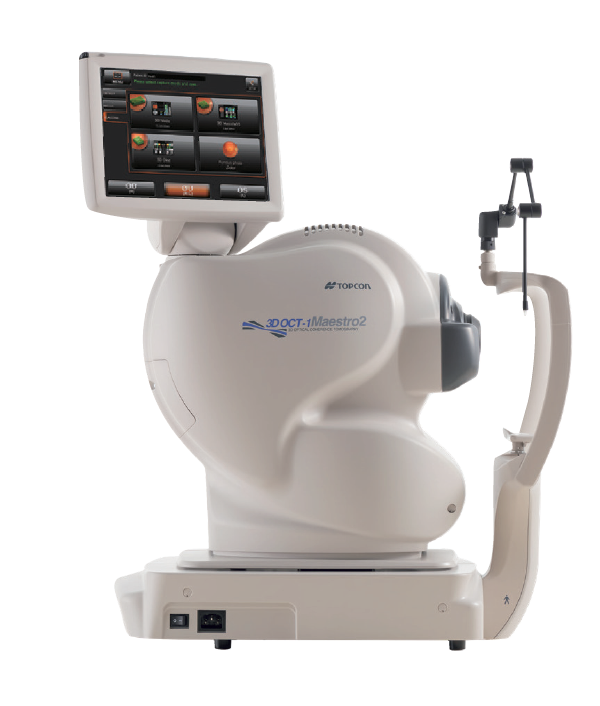
MECS is an NHS service for patients aged 16 and over who are registered with a Lewisham, Lambeth, Bexley or Southwark GP, to access an accredited local optometrist if they experience a minor eye condition.
If you are unsure whether your symptoms qualify for MECS, please contact us and we will be happy to offer you some advice.
If you have any of the following conditions you must go directly to your nearest Accident and Emergency Department:
If you already have an eye condition which is being treated, such as cataracts or glaucoma, you will not be covered by MECS and you should contact whoever is treating you.
Remember: you may not be able to drive immediately after the eye examination.
All you need to do is call us, explain the problem and ask if you can have a MECS appointment. Alternatively, if you make an appointment to see your GP, he or she may refer you to an optometrist (us) for treatment.
Our optometrist will discuss your eye history, any symptoms you may be experiencing and any related medical history. You will receive an eye assessment relevant to your symptoms.
Please bring along a list of all current medications and your current glasses with you to the appointment.
As a result of the consultation you may be:
Following your appointment, the optometrist will notify your GP about the outcome of your consultation, in order to ensure your medical records are updated
This service does not replace routine eye examinations and will not cover you for the cost of new glasses or lenses.
A sight test will not be performed as part of your MECS assessment or treatment and you will not be issued with a prescription for glasses.
As Covid restrictions lifted on Monday 19th July, inline with Government Guidance, Optical Bodies, as directed by the NHS, and as a duty of care for our patients and staff, please wear a mask when visiting our branches. Remember that there may be staff and other patients at the practice still waiting for a second vaccination, or who may be vulnerable in ways that aren’t always visible.
In addition we will continue social distancing, use of hand sanitiser (for patients & staff) wearing of masks and PPE (where applicable), continue pre-screening with Covid-19 questions when making appointments, sterilising equipment, frames etc, making appointments for eye examinations, dispensing and collections wherever possible and disinfection of surfaces, chairs etc.
Let’s take good care of each other and stay safe.
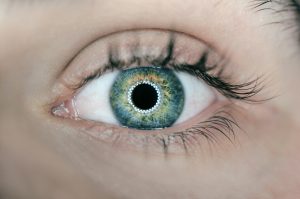
Please complete this form and we will contact you to confirm your appointment.

